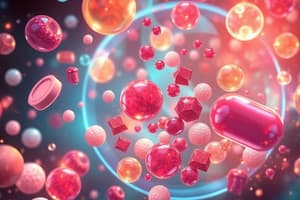Podcast
Questions and Answers
What is the purpose of a loading dose when administering medication?
What is the purpose of a loading dose when administering medication?
- To achieve immediate drug effect (correct)
- To increase the drug's potency
- To maintain drug blood levels within a therapeutic range
- To reduce the half-life of the drug
Which factor does NOT affect renal excretion of drugs?
Which factor does NOT affect renal excretion of drugs?
- Half-life of the drug
- Glomerular filtration rate (GFR)
- Urine pH
- Receptor affinity (correct)
What defines the term 'potency' in pharmacodynamics?
What defines the term 'potency' in pharmacodynamics?
- The speed at which the drug acts
- The amount of drug needed to produce an effect (correct)
- The safety margin of the drug
- The duration of the drug's action
Which statement best describes competitive antagonism?
Which statement best describes competitive antagonism?
What might be an effect of decreased renal function on drug metabolism?
What might be an effect of decreased renal function on drug metabolism?
What is the term for the phenomenon where the combined effect of two drugs is greater than the sum of their individual effects?
What is the term for the phenomenon where the combined effect of two drugs is greater than the sum of their individual effects?
What type of drug action involves relieving symptoms without affecting the underlying disease?
What type of drug action involves relieving symptoms without affecting the underlying disease?
In drug interactions, which term describes the effect where one drug increases the effect of another?
In drug interactions, which term describes the effect where one drug increases the effect of another?
Which of the following is NOT a category of drug action?
Which of the following is NOT a category of drug action?
Which drug classification describes the replacement of body fluids or substances?
Which drug classification describes the replacement of body fluids or substances?
What does therapeutic equivalence imply regarding generic drugs and brand name drugs?
What does therapeutic equivalence imply regarding generic drugs and brand name drugs?
Which term describes the individual drug effect that leads to a reduction in cell activity or secretion?
Which term describes the individual drug effect that leads to a reduction in cell activity or secretion?
Which concept explains the situation where the combined effect of two drugs results in an effect equal to the sum of their individual effects?
Which concept explains the situation where the combined effect of two drugs results in an effect equal to the sum of their individual effects?
Which factor does not influence the absorption of a drug into the bloodstream?
Which factor does not influence the absorption of a drug into the bloodstream?
What is the primary organ responsible for drug metabolism?
What is the primary organ responsible for drug metabolism?
Which outcome of drug metabolism can lead to increased toxicity?
Which outcome of drug metabolism can lead to increased toxicity?
What does bioavailability refer to in pharmacology?
What does bioavailability refer to in pharmacology?
Which absorption mechanism involves the active transport of substances by cells?
Which absorption mechanism involves the active transport of substances by cells?
Which factor is not associated with drug distribution within the body?
Which factor is not associated with drug distribution within the body?
What is the primary process by which drugs are eliminated from the body?
What is the primary process by which drugs are eliminated from the body?
Which of the following does not affect drug metabolism?
Which of the following does not affect drug metabolism?
Flashcards are hidden until you start studying
Study Notes
General Drug Classification
- Classifications include OTC (Over-the-Counter) drugs, prescription drugs, and illegal or recreational drugs.
- Focus on understanding drugs by category rather than memorizing each drug individually.
Major Areas of Pharmacology
- Pharmacokinetics: Involves ADME (Absorption, Distribution, Metabolism, Excretion) of drugs.
- Pharmacodynamics: Examines biochemical and physiological drug effects and their Mechanism of Action (MOA).
- Pharmacotherapeutics: Analyses drug utilization for disease treatment.
Pharmacokinetics
- Absorption: Movement of a drug into the bloodstream from its site of administration.
- Influenced by factors such as blood flow, food intake, and drug solubility.
- Absorption methods include passive, active, and pinocytosis.
- Distribution: Transport of drugs to various body tissues.
- Affected by circulation, cell membrane permeability, and plasma protein binding.
- Bioavailability: measures the percentage of drug reaching systemic circulation.
- Metabolism: Process of converting a drug into a less active form, predominantly in the liver.
- Influenced by age, nutrition, and liver function.
- Excretion: Elimination of drugs from the body via kidneys or other routes.
- Factors like glomerular filtration rate (GFR) and urine pH affect renal excretion.
Special Considerations for Older Adults
- Age-related changes impact drug absorption, metabolism, renal function, and organ responsiveness.
Pharmacodynamics
- Mechanism of Action (MOA): Explains how a drug exerts its effects.
- Indication and Contraindication: Describes permissible uses and conditions to avoid drug administration.
- Dosing Concepts:
- Maintenance Dose: Sustains therapeutic drug levels.
- Loading Dose: Initial high dose for rapid effect.
- Potency: Strength needed to elicit a specific response.
- Receptor Interactions:
- Agonists: Drugs that stimulate responses; characterized by affinity and efficacy.
- Antagonists: Drugs that block responses; can compete with agonists.
- Partial Agonists: Exhibit characteristics of both agonists and antagonists.
Drug Interactions and Effects
- Idiosyncratic Reactions: Unusual drug responses differing from expected outcomes.
- Drug Antagonism and Summation:
- Antagonism results in a lesser combined effect.
- Summation equals the additive effects of drugs.
- Synergism: Combined drug effects greater than individual contributions.
- Potentiation: One drug enhances the effect of another.
General Properties of Drugs
- Drugs do not impart new functions; they modify existing physiological processes.
- Drugs can have multiple actions on different bodily functions.
Therapeutic Actions
- Palliative: Alleviates symptoms without altering disease progression.
- Curative: Aims to treat or eliminate diseases.
- Supportive: Maintains bodily functions during treatments.
- Substitutive: Replaces missing body components.
- Chemotherapeutic: Targets and destroys malignant cells.
- Restorative: Aims to return the body to a healthy state.
Categories of Drug Action
- Stimulation: Increases activity or secretion.
- Depression: Reduces activity or secretion.
- Replacement: Supplies essential body components.
- Inhibition: Kills or eradicates organisms.
- Irritation: Induces bodily response (e.g., laxatives promoting bowel movement).
Drug Classification
- Specific Names: Complex chemical names reflect structure.
- Generic vs. Brand Name:
- Generic: Official name; typically more affordable and preferred by consumers and insurance.
- Brand Name: Commercial name that varies; may be more expensive.
- Therapeutic Equivalence: Generic drugs shown to be interchangeable with brand names by FDA standards.
Studying That Suits You
Use AI to generate personalized quizzes and flashcards to suit your learning preferences.



